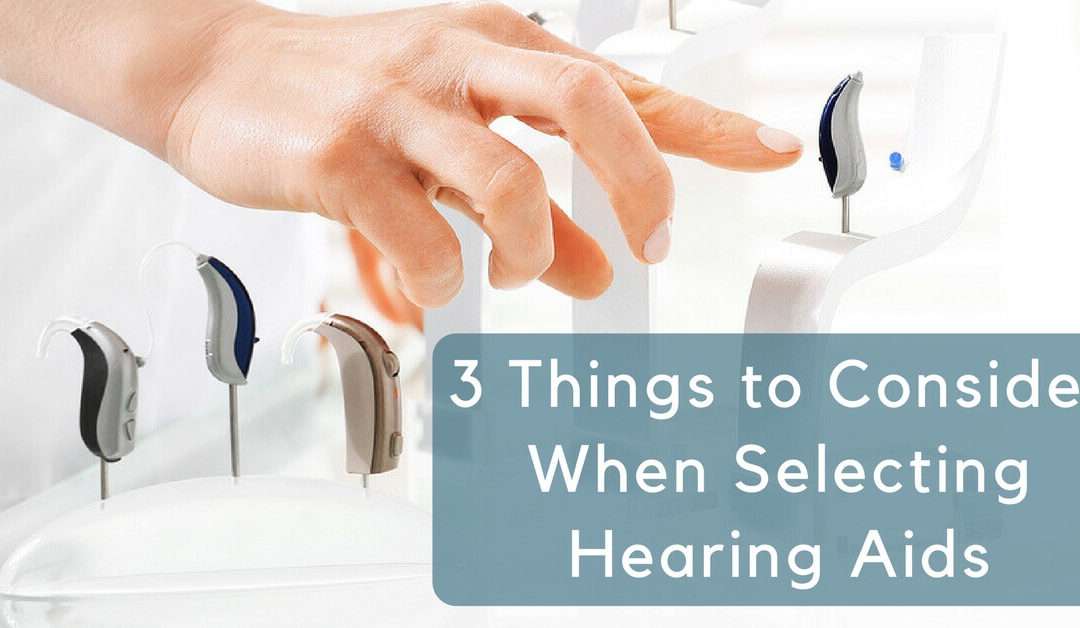Have you been experiencing changes in your hearing?
Hearing loss is a common medical condition that affects 20% of the US population, regardless of age. As an invisible condition, hearing loss tends to appear gradually. It is estimated that most people wait an average of five to seven years between the time they first notice changes in their hearing and seeking treatment for hearing loss.
Hearing aids are the most common treatment for hearing loss. In order to experience the maximum benefits of hearing aids, there are several important considerations to make before committing to a pair of hearing aids.
Here are five things to consider when selecting hearing aids
Getting a Hearing Test
Have you gotten a hearing test yet? This is the most important step to selecting hearing aids. Though there are new trends in over-the-counter hearing aids, keep in mind that hearing loss is a medical condition, which means you should seek professional care to treat it.
Contact an audiologist or licensed hearing specialist in your area to schedule a hearing test. Hearing tests, often complimentary, are painless and quick, usually lasting no more than an hour. During the hearing test, your audiologist or hearing specialist will review your personal medical history, perform a physical examination of your ears (with an otoscope) to check for any blockage or injury, and then test your hearing with a series of exams.
Comprehensive hearing tests measure your current hearing abilities by ear. The results, recorded in an audiogram, will provide your audiologist or hearing specialist with details about your hearing abilities in terms of frequency and volume. It will also tell them the degree and configuration of your hearing loss.
Your audiologist or hearing specialist will review the results with you. If a related medical condition exists, they will be qualified to provide you with professional advice. If a hearing loss is detected, your audiologist or hearing specialist will provide you with recommendations for the next step: selecting the best hearing aid to meet your specific hearing needs.
Elements of Your Lifestyle
Hearing aids are incredible devices: they reconnect us to the sounds of our life. Hearing aids are equipped with many different features, which provide us different kinds of access depending on the environment. Hence, it’s important to consider the different parts of your life when considering the best hearing aids.
If you are currently employed, think about how hearing aids would fit into your day on the job. Do you work in a loud environment? You may want to look for hearing aids that provide comfortable listening. There are features available to soften loud sounds. If you work with large group of people, you may want to look for hearing aids that provide the best speech recognition in busy environments. Certain hearing aids offer connection to assistive listening devices, which may also be helpful in meetings.
Do you lead an active life? Do you go to the gym every day? Ask your hearing professional about the different kinds of features available to protect your hearing aids from moisture. If you’re an avid hiker or spend a lot of time outdoors, look for hearing aids that feature wind protection. Hearing aids are constructed with different water and dirt resistant materials to ensure proper function.
Test Driving Hearing Aids
Once you’ve narrowed down your options to a few great models, how do you know which hearing aid will be best for you? Ask your hearing professional if they offer a test drive for the hearing aids.
Hearing is a highly personal experience. It’s one thing to hear clearly and comfortably in the quiet environment of an audiologist’s office; it’s an entirely different thing to go out into the world and experience instant access to sounds you’ve missed over the years. In fact, it can be downright overwhelming.
With a test drive, you’ll be able to experience hearing aids in a variety of different real-life environments. You’ll be able to make adjustments to volume and program features to meet your specific needs. And if a particular pair of hearing aids do not quite work for you, then you won’t be stuck with them! You can move on to test drive another pair until you find the perfect fit.
Visit an audiologist/hearing specialist today and take control of your hearing health.

